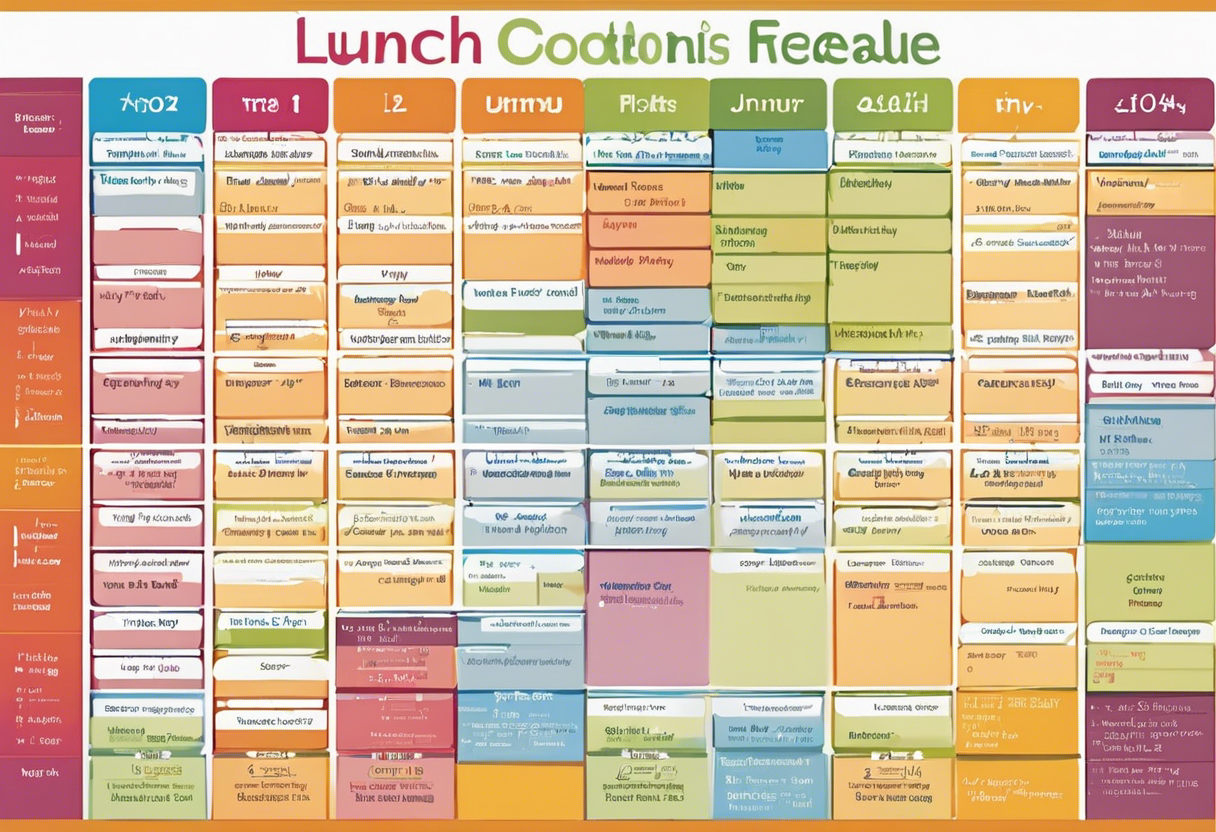
Here's an overview:
- Understanding the challenges of gaining weight for slim individuals
- 1. High metabolic rate
- 2. Small appetite
- 3. Active lifestyle
- 4. Genetics
- 5. Psychological factors
- Setting Realistic Weight Gain Goals
- Developing a balanced and nutritious meal plan
- Incorporating Strength Training into Your Fitness Routine
- Utilizing high-calorie and nutrient-dense food choices
- Exploring Supplementation Options to Support Weight Gain
- Creating a consistent eating schedule
- Managing stress and prioritizing adequate sleep for optimal weight gain
- Monitoring progress and making adjustments as needed
- Seeking support from healthcare professionals and nutrition experts
Understanding the challenges of gaining weight for slim individuals

Gaining weight can come with its own set of challenges, especially for individuals who naturally have a slim build. While some people may struggle to lose weight, others find it just as difficult to gain weight and achieve a healthy body mass. Understanding the unique obstacles faced by slim individuals can help in developing effective strategies for healthy weight gain.
1. High metabolic rate
One of the primary reasons why gaining weight can be challenging for slim individuals is their naturally high metabolic rate. Metabolism refers to the process by which the body converts food into energy. Slim individuals often have a faster metabolism, which means they burn calories more efficiently. As a result, they may need to consume a higher amount of calories to gain weight compared to others.
2. Small appetite
Slim individuals might also struggle with a smaller appetite. They may find it difficult to consume large meals or feel satisfied with smaller portions. A lack of appetite can make it challenging to consume the necessary caloric intake required for weight gain. It's important for individuals in this situation to focus on consuming nutrient-dense, calorie-rich foods to meet their calorie goals.
3. Active lifestyle
People with a naturally slim build often tend to have an active lifestyle. Regular exercise and physical activity are important for overall health and well-being, but they can also burn additional calories, making it harder to gain weight. Finding a balance between exercise and calorie intake is crucial for individuals looking to increase their body weight.
4. Genetics
Genetics also play a significant role in a person's body type and metabolism. Slim individuals may have inherited genes that make it more challenging for them to gain weight. While genetics cannot be changed, understanding their influence can help individuals develop realistic expectations and tailor their approach to weight gain accordingly.
5. Psychological factors
Slim individuals may face unique psychological challenges when it comes to gaining weight. Society often idealizes thinness, and this can lead to body image issues and a desire to stay slim. Overcoming these psychological barriers and focusing on the health benefits of weight gain can be crucial for achieving healthy results.
Understanding these challenges can help slim individuals develop a targeted and effective approach to gaining weight. By addressing the high metabolic rate, small appetite, active lifestyle, genetics, and psychological factors, individuals can tailor their diet and exercise routines to support healthy weight gain. It's important to consult with a healthcare professional or registered dietitian to create a personalized plan that takes these challenges into account.
Setting Realistic Weight Gain Goals

When it comes to healthy weight gain, setting realistic goals is essential to achieve long-term success. It's important to approach weight gain in a mindful and sustainable way, as rapid weight gain can have negative consequences on both physical and mental health. Here are some tips for setting realistic weight gain goals for slim individuals:
Consult with a healthcare professional: Before embarking on a weight gain journey, it's advisable to consult with a healthcare professional such as a registered dietitian or a doctor. They can provide personalized advice based on your specific health needs and help you set realistic goals that align with your body type, metabolism, and overall well-being.
Calculate your calorie needs: To successfully gain weight, you need to consume more calories than your body burns. Determine your current daily calorie intake and then gradually increase it by consuming additional nutrient-dense foods. Consider using online calculators or seek assistance from a professional to estimate your calorie needs accurately.
Focus on nutrient-dense foods: Rather than relying on high-calorie junk food to gain weight, it's essential to choose nutrient-dense options. Opt for foods that are rich in healthy fats, complex carbohydrates, lean proteins, and a variety of vitamins and minerals. Include foods like avocados, nuts, seeds, whole grains, lean meats, dairy products, and fruits and vegetables in your diet.
Set small, achievable goals: Break your weight gain journey into smaller milestones to make it more attainable. Aim for gaining 0.5-1 pound per week, as this is a realistic and healthy rate of weight gain. Setting smaller goals will help you stay motivated and track your progress more effectively.
Monitor your progress: Regularly monitor your weight and body measurements to assess your progress accurately. Keep a food diary to track your calorie intake and identify any patterns or areas where you might need to make adjustments. Additionally, consider seeking support from a nutritionist or joining a support group to stay accountable and get expert guidance.
Be patient and stay consistent: It's important to understand that weight gain takes time and consistency. Avoid getting frustrated if you don't see significant results immediately. Stay committed to your nutrition and exercise plan, making adjustments as necessary, and remember that slow and steady progress is more sustainable in the long run.
By setting realistic weight gain goals, you can ensure a healthy and sustainable approach to achieving your desired weight. Remember to prioritize your overall health and well-being throughout the process, and seek professional guidance when needed. Remain patient and persistent, and celebrate each milestone as you move towards a healthier version of yourself.
Developing a balanced and nutritious meal plan

When it comes to healthy weight gain, a balanced and nutritious meal plan plays a crucial role. It not only helps in increasing calorie intake but also ensures that the body receives all the essential nutrients it needs to function optimally. Here are some top tips for developing a balanced and nutritious meal plan for slim individuals looking to gain weight:
Calorie surplus: To promote weight gain, it is important to consume more calories than your body burns. Calculate your daily calorie needs by considering factors such as age, gender, activity level, and weight goals. Aim for a modest surplus of 250-500 calories per day to gradually gain weight without excessive fat gain.
Macronutrient distribution: A well-balanced meal plan should include an optimal distribution of macronutrients. Approximately 45-60% of calories should come from carbohydrates, 20-30% from protein, and 20-30% from healthy fats. This will provide your body with the necessary energy, building blocks for muscle growth, and essential fatty acids.
Include nutrient-dense foods: Focus on incorporating nutrient-dense foods into your meal plan. These include lean proteins like chicken, fish, tofu, and legumes, complex carbohydrates like whole grains, fruits, and vegetables, and healthy fats from sources like nuts, avocados, and olive oil. These foods will provide the necessary vitamins, minerals, and antioxidants to support overall health and wellbeing.
Frequent meals and snacks: Instead of relying on three large meals, aim to have smaller, more frequent meals and snacks throughout the day. This will help in increasing calorie intake without feeling overly full. Include protein-rich foods in each meal to support muscle growth and repair.
Pre- and post-workout nutrition: If you're incorporating regular exercise into your routine, pay attention to pre- and post-workout nutrition. Consume a balanced snack or meal containing carbohydrates and protein before your workout to provide energy and support muscle building. After your workout, have a protein-rich snack to aid in muscle recovery and growth.
Hydration: Don't forget the importance of staying hydrated. Drink an adequate amount of water throughout the day to support proper digestion, nutrient absorption, and overall health. Avoid excessive consumption of sugary beverages or alcohol, as they can contribute to empty calories and may hinder weight gain goals.
Remember, consult with a registered dietitian or nutritionist to develop a personalized meal plan that suits your specific needs and goals. They can provide guidance on portion sizes, specific food choices, and any dietary restrictions you may have.
By adopting a balanced and nutritious meal plan tailored to your needs, you can support healthy weight gain and ensure that your body receives the necessary nutrients to thrive. Stick to the plan consistently, monitor your progress, and make adjustments as necessary for optimal results.
Incorporating Strength Training into Your Fitness Routine

In order to achieve healthy weight gain, incorporating strength training into your fitness routine is essential. While cardio exercises are great for cardiovascular health and burning calories, strength training helps build muscle mass, which can contribute to weight gain in a healthy way. Here are some tips to help you incorporate strength training into your fitness routine:
Start with the basics: If you are new to strength training, it is important to start with the basics to avoid injury. Begin by learning proper form for exercises such as squats, deadlifts, bench presses, and shoulder presses. You can enlist the help of a personal trainer or watch instructional videos to ensure that you are performing these exercises correctly.
Gradually increase weight: As you become more comfortable with strength training, gradually increase the amount of weight you lift. This will challenge your muscles and stimulate growth. Start with lighter weights and gradually work your way up to heavier ones. Remember to always listen to your body and avoid lifting weights that are too heavy for you, as this can lead to injury.
Include compound exercises: Compound exercises work multiple muscle groups at once, which can help you build strength and muscle mass more efficiently. Some examples of compound exercises include squats, deadlifts, lunges, bench presses, and pull-ups. Incorporating these exercises into your routine will provide a comprehensive workout for your entire body.
Don't neglect rest and recovery: Rest and recovery are crucial aspects of any fitness routine, including strength training. When you lift weights, you are essentially breaking down muscle tissue. It is during the recovery period that the muscles repair and grow stronger. Schedule rest days in between your strength training sessions to allow your muscles to recover. Additionally, make sure to prioritize getting enough quality sleep and fueling your body with nutritious foods.
Mix up your routine: To continue seeing progress and avoiding plateaus, it is important to mix up your strength training routine regularly. This can involve changing the exercises you do, varying the number of sets and repetitions, or incorporating different training techniques such as supersets or drop sets. By constantly challenging your muscles in new ways, you will continue to stimulate growth and improve your overall strength.
Incorporating strength training into your fitness routine is a crucial component of healthy weight gain. By following these tips and staying consistent with your workouts, you can effectively build muscle mass and achieve your weight gain goals while promoting overall health and well-being. Remember to start slowly and gradually increase the intensity of your workouts, and always listen to your body to avoid injury.
Utilizing high-calorie and nutrient-dense food choices

When trying to gain weight in a healthy manner, it is important to focus on consuming high-calorie and nutrient-dense foods. These choices provide the necessary energy and nutrients needed to support weight gain while ensuring overall health and well-being. Here are some tips on how to incorporate these foods into your diet:
Incorporate healthy fats: Healthy fats, such as avocados, nuts, seeds, and oils, are excellent sources of calories and essential fatty acids. Adding these to meals and snacks can significantly increase your calorie intake without compromising on nutrition.
Include protein-rich foods: Protein is essential for building and repairing tissues, which is crucial for weight gain. Opt for lean sources of protein such as chicken, fish, tofu, beans, and lentils to ensure a well-rounded diet.
Choose whole grains: Whole grains such as brown rice, quinoa, oats, and whole wheat bread are excellent sources of complex carbohydrates and fiber. These not only provide energy but also help keep you feeling full and satisfied.
Opt for calorie-dense snacks: Instead of relying on high-sugar and processed snacks, choose healthier alternatives that are both calorie-dense and nutrient-rich. Examples include trail mix, nut butter, granola bars, smoothies with added protein powder and fruits, and Greek yogurt with fruits and nuts.
Increase portion sizes: When trying to gain weight, it's essential to eat larger portion sizes and eat more frequently. Focus on adding an extra serving of each food group to your meals, ensuring a balanced plate with a variety of nutrients.
Don't skip meals: Consistency is key when it comes to healthy weight gain. Make sure to have regular meals and snacks throughout the day to meet your increased calorie needs. Skipping meals can lead to inadequate nutrient intake and hinder weight gain efforts.
Stay hydrated: Drinking enough fluids is often overlooked when focusing on weight gain. Opt for calorie-rich beverages such as smoothies, milk, and 100% fruit juice to boost your calorie intake while staying hydrated.
Remember, it's important to consult with a healthcare professional or a registered dietitian to create a personalized meal plan that suits your specific needs and goals. They can provide guidance on portion sizes, individual dietary requirements, and any necessary supplementation.
By making these high-calorie and nutrient-dense food choices, you can support healthy weight gain while ensuring that your body receives the necessary nutrients it needs to thrive. Keep in mind that patience and consistency are crucial in this journey, as healthy weight gain takes time and effort.
Exploring Supplementation Options to Support Weight Gain

When it comes to achieving healthy weight gain, incorporating supplements into your diet can be a helpful strategy. While they should never be seen as a replacement for a balanced diet, supplements can provide an extra boost of nutrients that support weight gain and muscle development. Here are some supplementation options to consider:
Protein Powder: Protein is an essential nutrient for muscle growth and repair. Protein powders, such as whey or casein, can be easily incorporated into your daily routine by adding them to shakes, smoothies, or even oatmeal. These powders are a convenient way to increase your protein intake, helping to promote weight gain and muscle mass.
Creatine: Creatine is a naturally occurring compound found in small amounts in certain foods, but it can also be taken as a supplement to enhance muscle strength and increase workout performance. By increasing the availability of energy in your muscles, creatine can support weight gain and muscle growth when combined with resistance training.
Branched-Chain Amino Acids (BCAAs): BCAAs are a group of essential amino acids (leucine, isoleucine, and valine) that play a crucial role in muscle protein synthesis. Taking BCAA supplements before or after exercise can help to promote muscle growth and prevent muscle breakdown, which is particularly beneficial for those looking to gain weight.
Omega-3 Fatty Acids: While commonly associated with heart health, omega-3 fatty acids also play a role in muscle growth and weight gain. These healthy fats have anti-inflammatory properties that can aid in recovery and reduce muscle soreness, allowing for more frequent and intense workouts. Adding omega-3 supplements, such as fish oil capsules, to your diet can support healthy weight gain.
Multivitamins and Minerals: A well-rounded diet is key to healthy weight gain, but sometimes it can be challenging to meet all of your nutritional needs through food alone. Taking a high-quality multivitamin can help fill in any nutrient gaps and ensure that your body has all the essential vitamins and minerals needed for optimal health and weight gain.
It's important to note that before starting any supplementation regimen, it is advisable to consult with a healthcare professional or a registered dietitian. They can help determine which supplements are appropriate for your goals and provide guidance on dosage and potential interactions.
Remember, while supplements can be beneficial, they should always be used in conjunction with a balanced diet and regular exercise routine. Prioritizing whole, nutrient-dense foods should be the foundation of any weight gain strategy, with supplementation serving as an additional support tool.
Creating a consistent eating schedule

One of the most important strategies for healthy weight gain is establishing a consistent eating schedule. This means sticking to regular meal times and having structured eating patterns throughout the day. By doing so, slim individuals can ensure they are consuming enough calories to support their weight gain goals.
Here are some tips to create a consistent eating schedule:
Set regular meal times: Plan to have three main meals (breakfast, lunch, and dinner) at the same time each day. This helps regulate hunger and maintains a steady intake of nutrients throughout the day.
Include snacks: Incorporate nutritious snacks between meals to provide additional calories and nutrients. Choose healthy options like nuts, seeds, yogurt, or fruits to keep energy levels up between meals.
Avoid skipping meals: Skipping meals can lead to a decrease in calorie intake, making it harder to achieve weight gain goals. Make a conscious effort to eat even when not feeling particularly hungry.
Listen to hunger cues: Pay attention to signs of hunger, such as a growling stomach or low energy levels. Eating when hungry and stopping when full helps maintain a consistent eating schedule and supports healthy weight gain.
Pre-plan meals: Take the time to plan and prepare meals in advance. This helps ensure that meals are balanced, nutritious, and readily available when it's time to eat. Preparing meals ahead of time may be especially helpful for individuals with busy schedules.
Stick to regular portion sizes: While the goal is to intake more calories, it's important to avoid overeating or consuming excessive portions. Strike a balance by consuming larger portions of nutrient-dense foods like lean proteins, whole grains, and healthy fats.
Stay hydrated: Don't forget to include fluids throughout the day. Water, herbal teas, and fresh juices can help maintain hydration and support overall health.
Creating a consistent eating schedule is crucial for healthy weight gain. By setting regular meal times, incorporating snacks, pre-planning meals, and listening to hunger cues, slim individuals can ensure that they are consistently consuming enough calories and nutrients to support their weight gain goals.
Managing stress and prioritizing adequate sleep for optimal weight gain

Stress and lack of sleep can have a significant impact on weight gain, especially for slim individuals. Managing stress levels and prioritizing adequate sleep are crucial aspects of a healthy lifestyle that can support and optimize weight gain. Here are some tips for effectively managing stress and ensuring enough sleep for optimal weight gain:
Identify and address sources of stress: It is important to identify and address the sources of stress in your life. Whether it's work-related stress, relationship issues, or other factors, finding ways to manage and reduce stress levels can help create a more conducive environment for weight gain. Consider engaging in stress-relieving activities such as meditation, deep breathing exercises, or engaging in hobbies and activities that bring you joy and relaxation.
Establish a regular sleep routine: Setting a consistent sleep schedule is crucial for ensuring adequate rest and promoting healthy weight gain. Try to go to bed and wake up at the same time every day, even on weekends. Creating a bedtime routine, such as reading a book or taking a warm bath before sleep, can also signal to your body that it's time to wind down and prepare for restful sleep.
Create a sleep-friendly environment: Make sure your bedroom is a comfortable and inviting space for sleep. Keep the room cool, dark, and quiet, and invest in a comfortable mattress and pillows that support a good night's sleep. Avoid using electronic devices such as smartphones or laptops before bedtime, as the blue light emitted from these devices can disrupt your sleep patterns.
Practice relaxation techniques: Incorporating relaxation techniques into your daily routine can help reduce stress levels and improve sleep quality. Deep breathing exercises, mindfulness meditation, and progressive muscle relaxation are just a few examples of relaxation techniques that can promote restful sleep and support optimal weight gain.
Limit caffeine and alcohol intake: While moderate caffeine intake can have some benefits, too much caffeine or consuming it too close to bedtime can disrupt sleep patterns and hinder weight gain efforts. Similarly, excessive alcohol consumption can interfere with the quality of your sleep. Limiting your intake of caffeine and alcohol, especially in the evening, can help support better sleep and weight gain.
In conclusion, managing stress and prioritizing adequate sleep are essential components of a healthy lifestyle and can greatly contribute to optimal weight gain, particularly for slim individuals. By implementing these tips and incorporating stress management techniques and good sleep habits into your routine, you can create a conducive environment for healthy weight gain and overall well-being.
Monitoring progress and making adjustments as needed

Monitoring your progress is crucial to ensure that your efforts to gain weight are effective and to make any necessary adjustments along the way. Here are some key tips for monitoring your progress and making adjustments as needed:
Keep track of your calorie intake: One of the most important aspects of gaining weight is consuming more calories than you burn. Keep a food diary or use a calorie tracking app to monitor your daily calorie intake. This will help you understand if you are consuming enough calories to support weight gain.
Monitor your weight: Regularly weigh yourself to track your progress. Aim for a steady and gradual weight gain of about 0.5-1 pound per week. If you are not seeing any weight gain, you may need to increase your calorie intake.
Assess your body composition: In addition to monitoring your weight, it's important to assess changes in your body composition. Keep an eye on your body fat percentage and muscle mass. If you notice that you are gaining more fat than muscle, consider adjusting your diet and exercise routine.
Track your macronutrient intake: Pay attention to the macronutrients in your diet - carbohydrates, proteins, and fats. Ensure that you are consuming an adequate amount of each. Protein is especially important for muscle growth, so make sure you are getting enough protein in your diet.
Adjust your calorie intake: If you are not seeing the desired weight gain, consider increasing your calorie intake by adding healthy, calorie-dense foods to your meals or snacks. This could include nuts and nut butter, avocados, olive oil, whole milk, and whole grain products.
Evaluate your exercise routine: Regular exercise is an important part of a healthy weight gain journey, but excessive cardio or intense workouts can burn too many calories. Consider reducing your cardio exercises and focus more on strength training to promote muscle growth.
Seek professional guidance if needed: If you are struggling to gain weight or if you have any underlying health concerns, it may be beneficial to consult with a registered dietitian or healthcare professional. They can provide personalized guidance and help you develop a tailored plan to achieve your weight gain goals.
Remember, gaining weight in a healthy manner takes time and patience. By monitoring your progress and making adjustments as needed, you can ensure that you are on track to reach your weight gain goals while maintaining your overall health and well-being.
Seeking support from healthcare professionals and nutrition experts

When attempting to gain healthy weight, it is crucial to seek support and guidance from healthcare professionals and nutrition experts. These experts can provide valuable advice and create personalized plans tailored to individual needs, ensuring effective and safe weight gain.
Consult healthcare professionals: A visit to a healthcare professional, such as a doctor or a registered dietitian, is an essential first step. They can assess your overall health, identify any underlying medical conditions that may be hindering weight gain, and recommend appropriate strategies. They will take into account your medical history, lifestyle, and dietary preferences, ensuring a well-rounded approach to weight gain.
Work with a registered dietitian: A registered dietitian is a valuable resource when it comes to gaining weight in a healthy manner. They can provide detailed meal plans, help identify nutrient deficiencies, and offer guidance on portion sizes and food choices. A dietitian can also address any concerns or questions you may have throughout the weight gain journey, providing continuous support and motivation.
Seek assistance with meal planning: Healthcare professionals and nutrition experts can assist in creating personalized meal plans that promote weight gain. These plans will focus on nutrient-dense, calorie-rich foods to ensure that weight gain occurs in a healthy way. They can help in crafting meals that include a balance of carbohydrates, proteins, and fats, along with incorporating fruits, vegetables, and whole grains.
Explore nutritional supplements: In some cases, healthcare professionals may recommend nutritional supplements to support weight gain efforts. These supplements can help increase calorie intake and provide essential nutrients. However, it is important to consult with a healthcare professional or a registered dietitian before incorporating any supplements into your routine to ensure they are safe and appropriate for your specific needs.
Monitor progress and adjust as needed: Regular check-ins with healthcare professionals and nutrition experts are essential to monitor progress and make adjustments to the weight gain plan if necessary. They can assess any changes in body composition, provide ongoing support, and make modifications to the meal plan or supplementation as needed.
In conclusion, seeking support from healthcare professionals and nutrition experts is crucial when aiming to gain healthy weight. These experts can provide personalized guidance, assistance with meal planning, and monitor progress to ensure safe and effective weight gain. Through their expertise, individuals can embark on a weight gain journey that aligns with their overall health goals.

No comments:
Post a Comment